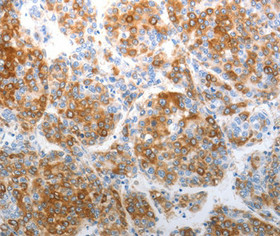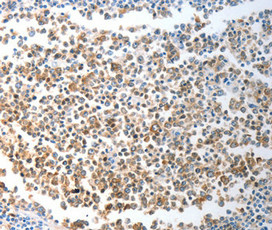CHD5 Antibody
-
货号:CSB-PA265689
-
规格:¥2024
-
图片:
-
其他:
产品详情
-
产品名称:Rabbit anti-Homo sapiens (Human) CHD5 Polyclonal antibody
-
Uniprot No.:Q8TDI0
-
基因名:CHD5
-
宿主:Rabbit
-
反应种属:Human,Mouse,Rat
-
免疫原:Synthetic peptide corresponding to residues near the C terminal of Human Cadherin 5, type 2 (vascular endothelium)
-
免疫原种属:Homo sapiens (Human)
-
克隆类型:Polyclonal
-
纯化方式:Antigen Affinity Purified
-
浓度:It differs from different batches. Please contact us to confirm it.
-
产品提供形式:Liquid
-
应用范围:ELISA,IHC
-
推荐稀释比:
Application Recommended Dilution IHC 1:50-1:100 -
Protocols:
-
储存条件:Upon receipt, store at -20°C or -80°C. Avoid repeated freeze.
-
货期:Basically, we can dispatch the products out in 1-3 working days after receiving your orders. Delivery time maybe differs from different purchasing way or location, please kindly consult your local distributors for specific delivery time.
相关产品
靶点详情
-
功能:Chromatin-remodeling protein that binds DNA through histones and regulates gene transcription. May specifically recognize and bind trimethylated 'Lys-27' (H3K27me3) and non-methylated 'Lys-4' of histone H3. Plays a role in the development of the nervous system by activating the expression of genes promoting neuron terminal differentiation. In parallel, it may also positively regulate the trimethylation of histone H3 at 'Lys-27' thereby specifically repressing genes that promote the differentiation into non-neuronal cell lineages. Tumor suppressor, it regulates the expression of genes involved in cell proliferation and differentiation. Downstream activated genes may include CDKN2A that positively regulates the p53/TP53 pathway, which in turn, prevents cell proliferation. In spermatogenesis, it probably regulates histone hyperacetylation and the replacement of histones by transition proteins in chromatin, a crucial step in the condensation of spermatid chromatin and the production of functional spermatozoa.
-
基因功能参考文献:
- CHD5 was identified as a direct target of miR-454. CHD5 was downregulated in GC tissues/cell lines and the expresssion of CHD5 inversely correlated with the level of miR-454 in GC tissues. Taken together, these observations indicate that HDAC3 is associated with GC cell growth via the miR-454-mediated targeting of CHD5. PMID: 29115379
- Data show that chromodomain helicase DNA binding protein 5 (CHD5) acted as a functional tumor suppressor and was frequently silenced by promoter CpG methylation in renal cell carcinoma (RCC). PMID: 26943038
- CHD5 may act as a tumor suppressor gene in NSCLC. PMID: 28400267
- s identified the CHD5 as a direct target of miR-454. CHD5 was downregulated in HCC tissues and cell lines and the expression level of CHD5 was inversely correlated with the expression of miR-454 in HCC tissues. PMID: 26287602
- Data show a mutual suppression regulation between chromodomain helicase DNA binding protein 5 (CHD5) and enhancer of zeste homolog 2 (EZH2, which may provide new insights into their potential therapeutic significance for hepatocellular carcinoma (HCC). PMID: 26517514
- CHD5 methylation of rectal cancer has a great effect in influencing its clinical and pathological features. PMID: 26753653
- Study shows that CHD5 is a Nucleosome remodeling and deacetylase complex-associated transcriptional repressor and identifies WEE1 as one of the CHD5-regulated genes that may link CHD5 to tumor suppression. PMID: 25247294
- Low CHD5 expression activates the DNA damage response and predicts poor outcome in patients undergoing adjuvant therapy for resected pancreatic cancer. PMID: 24276239
- CHD5 is a potential tumour suppressor gene epigenetically silenced in hepatocellular carcinoma. PMID: 24529164
- The tumor suppressor chromodomain helicase DNA-binding protein 5 (CHD5) remodels nucleosomes by unwrapping. PMID: 24923445
- repression of CHD5 gene expression in human leukemia is mediated in part by DNA methylation of its promoter. PMID: 24454811
- CHD5 activity is regulated by DNA methylation and repressive histone modifications. CHD5 likely acts as a tumor-suppressor gene in early colorectal carcinogenesis. PMID: 24243398
- CHD5 might act as a tumor suppressor in glioma PMID: 23707602
- These findings provide insights into the regulatory role of CHD5 during neurogenesis and suggest how inactivation of this candidate tumor suppressor might contribute to neuroblastoma. PMID: 23948251
- Decreased expression of chromodomain helicase DNA-binding protein 5 is associated with primary gallbladder carcinoma PMID: 22855185
- CHD% protein mediates the p53-dependent senescence program triggered by decreased JMJD2A levels. PMID: 23168260
- study concludes that down-regulation of CHD5, mediated at least in part by promoter methylation, contributes to the development and progression of human breast cancer PMID: 22569290
- In this Caucasian population, endometriosis seems to be associated with the tumor-suppressor gene CHD5. Our findings support recent data, suggesting that the 1p36 region plays an important role in endometrios. PMID: 22910690
- CHD5 is a potential tumor suppressor gene that is inactivated via an epigenetic mechanism in lung cancer. PMID: 22186629
- Studies identified three genes, CHD5, PAFAH1B1, and NME1, strongly associated with patient outcome. PMID: 22328561
- We conclude that (i) somatically acquired CHD5 mutations are rare in primary NBs, so inactivation probably occurs by deletion and epigenetic silencing. PMID: 22294723
- the association of between miR-211-regulated CHD5 expression and CHD5 function in colorectal tumorigenesis PMID: 22235338
- CHD5 is downregulated in a certain number of ovarian cancers and appears to be an adverse predictor candidate of ovarian cancer disease-free and total survival. PMID: 21860208
- data suggest that CHD5 is a tumor suppressor gene that is epigenetically downregulated in laryngeal squamous cell carcinoma. PMID: 21636313
- As only one of the 47 families studied has the CHD5 rs7513548 SNP variant, it appears to be a rare event and further screening of melanoma families is required to confirm whether or not CHD5 is involved in melanoma pathogenesis. PMID: 21250965
- Data show a strong association of CHD5 expression with favorable prognostic variables (age at diagnosis <12 months, low clinical stage, and favorable histology), overall survival and event-free survival. PMID: 20950435
- CHD5 is a tumor suppressor gene epigenetically down-regulated in gastric cancer PMID: 19840376
- CDH5 may play a role in the development of the nervous system, and it may also play a role in the pathogenesis of neural tumors. PMID: 12592387
- Study demonstrates that Chd5 functions as a tumor suppressor in vivo and implicates deletion of CHD5 in human cancer. PMID: 17289567
- A recent functional study identified chromodomain helicase DNA-binding protein 5 (CHD5) as a novel tumor suppressor mapping to 1p36. [REVIEW] PMID: 18413720
- CHD5 is the strongest candidate tumor suppressor gene that is deleted from 1p36.31 in neuroblastomas, and inactivation of the second allele may occur by an epigenetic mechanism. PMID: 18577749
- the DNA methylation profiles of CHD family members (CHD1-9) in different tumor types. PMID: 18698156
- study demonstrated the existence of somatic mutations and methylation of CHD5 in primary epithelial ovarian cancers; CHD5 may play a role as a tumor suppressor gene in ovarian cancer PMID: 18953434
显示更多
收起更多
-
相关疾病:Defects in CHD5 may be a cause of the development of cancers from epithelial, neural and hematopoietic origin. CHD5 is one of the missing genes in the del(1p36), a deletion which is extremely common in this type of cancers. A decrease of its expression, results in increased susceptibility of cells to Ras-mediated transformation in vitro and in vivo (PubMed:17289567).
-
亚细胞定位:Nucleus.
-
蛋白家族:SNF2/RAD54 helicase family
-
组织特异性:Preferentially expressed in total brain, fetal brain, and cerebellum. It is also moderately expressed in the adrenal gland and detected in testis.
-
数据库链接:
HGNC: 16816
OMIM: 610771
KEGG: hsa:26038
STRING: 9606.ENSP00000262450
UniGene: Hs.522898
Most popular with customers
-
-
YWHAB Recombinant Monoclonal Antibody
Applications: ELISA, WB, IF, FC
Species Reactivity: Human, Mouse, Rat
-
Phospho-YAP1 (S127) Recombinant Monoclonal Antibody
Applications: ELISA, WB, IHC
Species Reactivity: Human
-
-
-
-
-






















